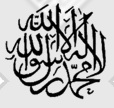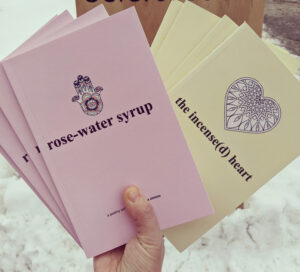 As with the months of Ramadan past, I usually take this time to focus on faith matters. To present a slight logic to the ordering of what I will post, I think it’s best to start with the very core of Islam, the basis, the foundation upon which everything else is built. Essentially, it is the entry into Islam: the Shahada (rhymes with ‘armada’).
As with the months of Ramadan past, I usually take this time to focus on faith matters. To present a slight logic to the ordering of what I will post, I think it’s best to start with the very core of Islam, the basis, the foundation upon which everything else is built. Essentially, it is the entry into Islam: the Shahada (rhymes with ‘armada’).
Unlike most other traditions, the entry into Islam is quite likely the simplest. It is the articulation of a few words in front of witnesses (two at minimum, I believe). This is the formal way, because I would argue that in keeping with the essence of Islam, one can be a Muslim in their heart quietly, before articulating it aloud.
This, I believe is because of a Muslim’s unhindered relationship with God – so, for example, Muslims are judged not on the outcomes of their actions, but rather on their intentions. The underlying message being that whereas wo/man – for the most part – judge what they see, God alone judges by what no one else can see: the intentions in one’s heart.
Another example of this is that there does not exist within Islam the concept of ex-communication. So, you see a man who professes to be a Muslim but does not pray, does not fast, does not pay zakaat – then you as a wo/man may not be the judge of him. You never possess the power to say: “You are not a Muslim”.
Furthermore, Muslims have neither clergy nor confession. There are both male and female scholars who dedicate their lives to extrapolating from within the Quran and the traditions of the Prophet greater expressions and laws for Muslims, but they are to guide, rather than to serve as God’s representatives on earth. No one has a more direct ‘line’ to God, no one speaks in God’s voice, no one forgives in God’s place.
Each and every single individual has – should they choose it – a direct line to God. When you turn towards God, that’s your open source. Period.
Back to the Shahada, which is rooted in the Arabic verb ‘to testify’. For the longest time, people would represent the Shahada as comprising the following two statements:
“La ilaha illa Allah” / “There is no god but God” &
“Sayidina Muhammad rasool Allah” / “Muhammad is the prophet of God”
Recently, I’ve been engrossed in reading more about this in order to widen and deepen my understanding of my own faith. I came across a very interesting concept, which I think deserves further enquiry. The idea being, there are in fact three parts to the Shahada, as follow:
“There is no god”
“But God”
“Muhammad is the prophet of God”
…and the more I think about that, the more it makes sense to me. Because this entire life is about choice. The ebb and flow of us is so greatly rooted in the cause and consequence of our choices – a charge from which no one is free and serves to speak equally to the beauty of the human condition as it does to the root of its greatest struggles and pain.
For most of us, we are born into a tradition that we never question. We are born Muslim, Jewish, Christian, Buddhist, Hindu, etc. and most of us live our lives passively reflecting the choices of our parents but never actively choosing which one suits us most, which one moves us and resonates most deeply within us.(1)
Based precisely on the above, I think to understand that the Shahada is in fact three-fold, is critical. In this way, it becomes the expression of a choice made based on critical thought and from a clean slate. It is to toil, before you conclude. It is to struggle, before you believe.(2) In any situation (not solely faith oriented), the freedom to choose and the choice made are perhaps the most empowering expressions of one’s self.
So, to those of you who believe, then I say: constantly renew your faith. Challenge yourself; you already know what your core is, and confidence comes from that awareness. You know your principles and your values and your ethics, and so you should harbour no fear in facing challenge. To those who are scared they might lose themselves; you will only be lost if you never knew yourself to begin with.
What will happen is that you will grow from this challenge, as I have seen myself grow over the last several months and I hope, Inshallah, for the rest of my life.
For those of you who are uncertain, the chances that you were born into one tradition or another is much more likely than not. And so you I applaud because you have already made an active choice that is fully and completely your own rather than one imposed on you by environment. May you too continue to challenge yourself and may that journey always be a safe one.
****************************
(1) According to the US Census Bureau, approximately 85% of the world’s population has one tradition or another. The other 15% defined as agnostic, atheist, secular humanist or ‘none’. Half of this 15% category define themselves as ‘theists’ but non-religious.
(2) Here, I think the key is to search for something – be it a tradition such as Islam, Christianity, Judaism or the absence of one, such as agnosticism. Seek what’s out there, find the one that stimulates and resonates and moves you, and then pursue further knowledge in order to satiate the original desire born of the search. I did this in my early twenties and have been doing a great deal of this in the last perhaps three years. It is exhausting, but the rewards of it and the confidence stemming from knowing yourself is truly immeasurable.
The image presented above is Arabic Islamic calligraphy of the Shahada.
————
Originally published 07/09/14.



Hawk said…
Thanks for sharing. I enjoyed the read and learning more!
Ato de…
Fri Sep 14, 07:53:00 PM
=======
Anonymous said…
One slight correction that was likely a typo.. “There is no God” is better translated “There is no god” with a small “g”. This is the difference in Arabic between “ilaha” i.e. “a god” (indefinite) and Allah, which is the same word with the article “the” or “Al” before it (definite).
What’s the big deal? This means one should allow nothing to become an effective diety in one’s life.. not one’s love for money, children, fame, power.. no diety of any kind except the one God that is the same God for all humanity. When truly practiced, it is an empowering statement to free us from being enslaved to specific joys in life.. we can love them, enjoy them , seek them but never make them OUR GOD.
You said it nicely ..
Fri Sep 14, 07:53:00 PM
==========
Anonymous said…
By the way, most non believers you mention in this post in the Census are North American and raised Catholic. They make up the bulk of this and why this is the case is the topic of many books. Since Lang is a raised catholic > atheist > muslim, I am interested in reading his book to find out why catholicism stopped working for him. Personally it didn’t answer enough questions and there were too many contradictions.
J
Mon Sep 17, 09:55:00 PM
==========
Maria Calvo said…
This is cool. I love learning about Islam because everything around us here is intending to make us hate Islam.
I love that you’re always giving us the opportunity to think really hard on what being Muslim really is. You’re so cool.
Maria
Thu Sep 20, 01:45:00 PM